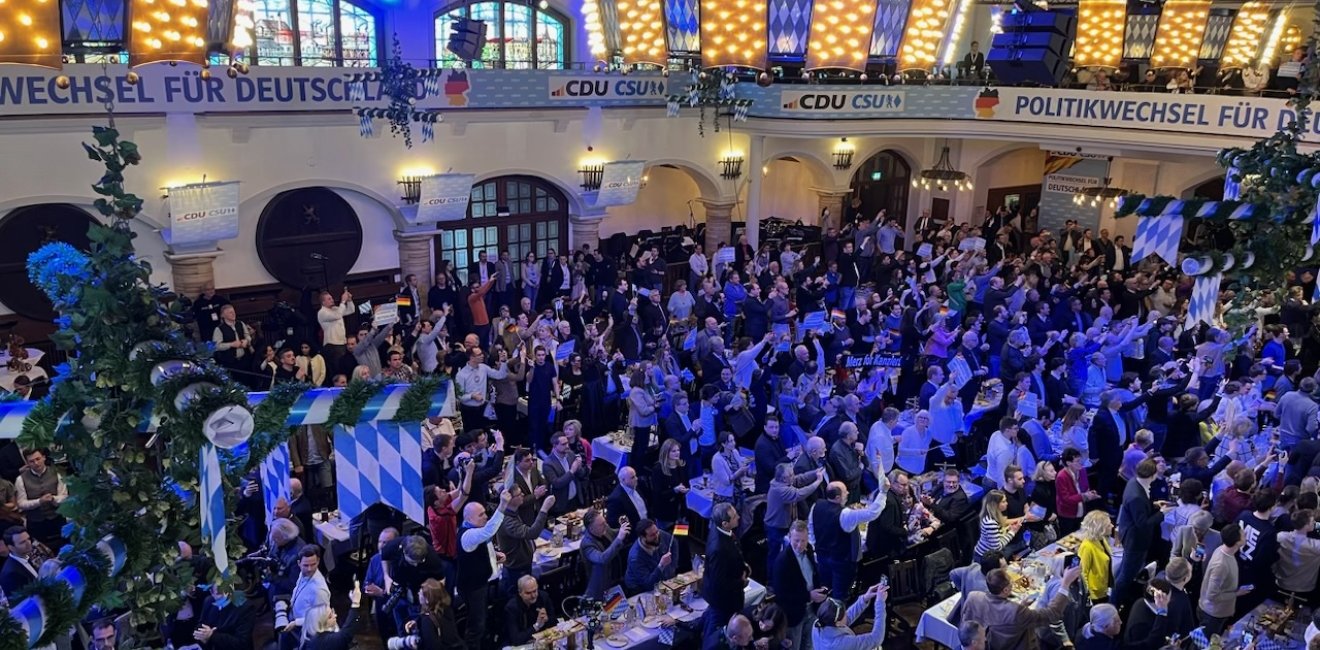It was no surprise when the traditional conservatives came out on top in Germany’s federal election on Sunday. Polls had consistently put them at the top of the multiparty heap in this short-fuse campaign. It was also no surprise when the current Chancellor, Olaf Scholz, paid a high price in voter dissatisfaction. No, the real surprise was finding America being a hot-button issue in the final days of the campaign.
At the start, the election focus was largely domestic: the after-effects of migration from Syria in 2015 and Ukraine in 2022, Germany’s long-stuttering economy, and unpopular climate change mandates. Elections were held early after Germany’s three-party coalition broke apart, day after the US elections, over the annual budget. The coalition partners paid the price for voter dissatisfaction: the Social Democratic Party (SPD) was down 9%, the Greens 3%, and the liberal Free Democratic Party (FDP) 7%. The FDP didn’t even earn enough votes to enter parliament, and its leader Christian Lindner now faces a well-earned leadership challenge. It was a punishing result for all three parties.
But the election took place just a week after the Munich Security Conference ended, where transatlantic controversy began. There, US Vice President Vance questioned Europe’s commitment to democratic principles, specifically questioning the exclusion of populist parties. “If you are running in fear of your own voters,” he said, “there is nothing America can do for you.” He argued that shutting people out of the political process was “the most surefire way to destroy democracy.” Coupled with his decision to meet separately with the leader of the populist right-wing Alternative for Germany (AfD), German politicians saw the speech as electoral interference. Elon Musk’s pro-AfD tweets doubled down on the message from America.
It was a message Germany’s political parties had not expected to hear. In a system where all German governments are coalitions, parties have ruled out working with AfD. Vance’s words challenged this “firewall.”
German officials were quick to push back in Munich. But no party leader could leave it at that in the week that followed. Pollsters questioned whether Vance’s apparent endorsement would help or hurt the AfD; in the end, AfD’s 20,8% of the vote aligned with polling trends throughout the campaign. Anti-American sentiment may have factored into a surprise protest surge for the Left party; badly trailing a few weeks earlier, the successor to the former East German Communist Party landed 8.8% of the vote. The Left surge also appeared to kick its breakaway challenger—the Sarah Wagenknecht Alliance (BSW)— into the political wilderness at the federal level.
Campaigning in Munich on election eve, the Christian Democratic Union (CDU) leader Friedrich Merz told a beer hall full of supporters that Europe—and Germany—needed to be stronger. In a direct reference to the US shut-out of Europeans from negotiations with Russia, Merz emphasized Europe needed a seat at the table to represent its interests—opposite Russia, China, and “when necessary” also the United States.
He meant it. In the traditional TV discussion with party leaders just after provisional election results were in, Merz suggested that the US government was largely indifferent to Europe’s fate. Would it be necessary to establish a swift European defense capability?
The election results point to a new coalition government between Merz’s CDU and the SPD. Crafting that ideologically-opposed partnership in Merz’s eight week timeframe might be rocky, and the SPD will have leadership issues following Scholz’s hefty loss. The parties’ views on economic policy diverge. Areas of agreement, however, could be defense spending and Ukraine. Scholz remains proud of swiftly turning around German policy following Russia’s invasion, as he underscored even while accepting his party’s loss on Sunday night.
Merz campaigned for a fundamental change of German policy. And while he initially meant economic policy (especially growth and competitiveness), the German-American relationship is also up for a reboot in his new government. What direction will the new government’s security policy take? Will it head in a more Europe-centric direction? What will that mean for NATO?
The American message in Munich a week ago made German-US relations an unexpectedly divisive German election issue. Germans now question whether their trust in the United States is misplaced. In losing that trust, America also lost something in Germany’s elections.
Author


Global Europe Program
The Global Europe Program is focused on Europe’s capabilities, and how it engages on critical global issues. We investigate European approaches to critical global issues. We examine Europe’s relations with Russia and Eurasia, China and the Indo-Pacific, the Middle East and Africa. Our initiatives include “Ukraine in Europe”—an examination of what it will take to make Ukraine’s European future a reality. But we also examine the role of NATO, the European Union and the OSCE, Europe’s energy security, transatlantic trade disputes, and challenges to democracy. The Global Europe Program’s staff, scholars-in-residence, and Global Fellows participate in seminars, policy study groups, and international conferences to provide analytical recommendations to policy makers and the media. Read more

Explore More
Browse Insights & Analysis
Greenland’s New Governing Coalition Signals Consensus

The Future of France's Far-Right Party

Ukrainian Issue in Polish Elections

